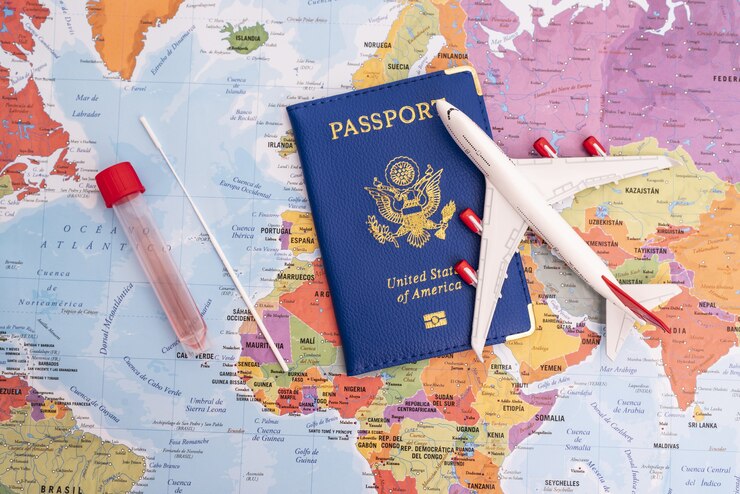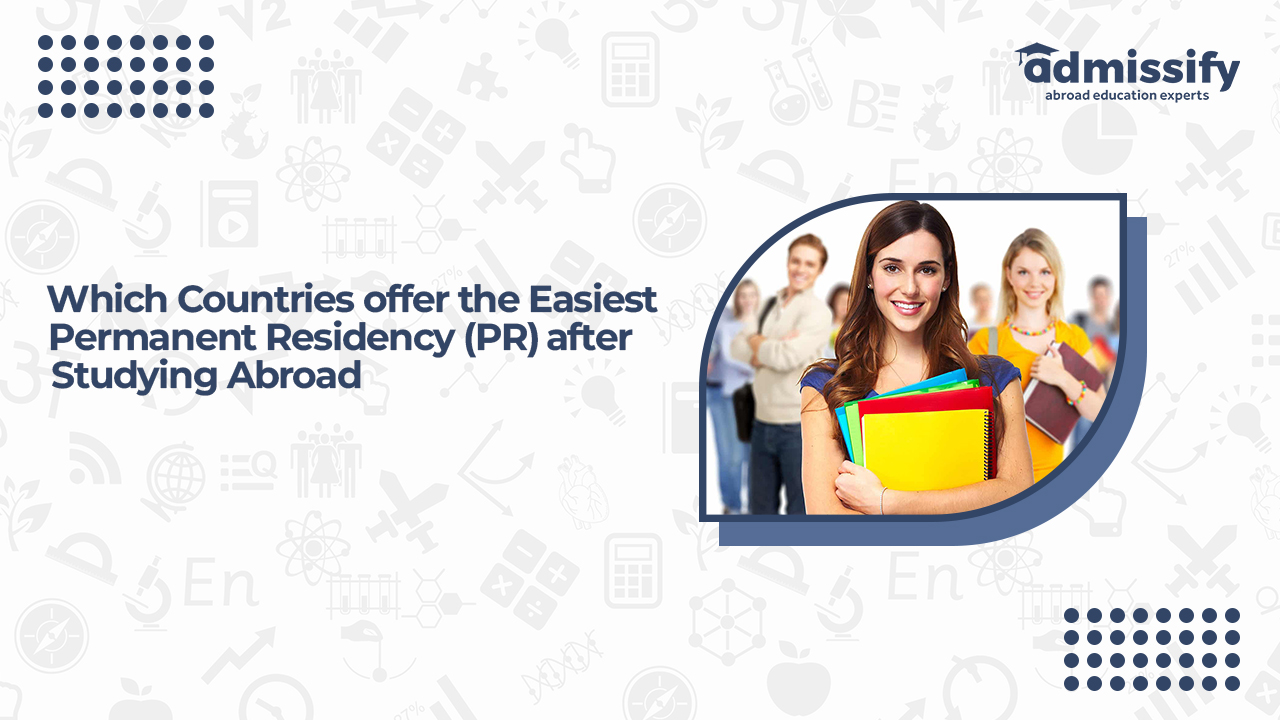Last Updated on December 13, 2024
Choosing to study abroad offers numerous benefits, including exposure to different cultures, access to world-class education, and personal growth. However, one of the most compelling advantages is the opportunity to secure permanent residency (PR) in the country of study. Gaining PR status provides long-term benefits, such as the ability to work, live, and potentially settle in a foreign country.
This article aims to explore the question, “Which countries offer the best permanent residency opportunities after studying abroad?” We will delve into some of the top study destinations that have attractive PR policies, allowing Indian students to transition from being temporary residents to permanent residents.
By examining various factors such as post-study work opportunities, immigration policies, ease of obtaining PR status, and overall quality of life, we will highlight countries that provide favorable conditions for Indian students to pursue their dreams of studying abroad and potentially settling down permanently.
Whether you aspire to build a career, gain global exposure, or seek a better quality of life, understanding the countries that offer favorable PR pathways after studying abroad is crucial. So, let’s embark on a journey to discover some of the top destinations that welcome and reward international students with the prospect of permanent residency.
Top 10 Easiest Countries to get PR for Indian Students
| Country | Pathways to PR | Additional Details |
| Canada | Canadian Experience Class (CEC), Provincial Nominee Programs | Welcoming attitude, diverse opportunities, Post-Graduation Work Permit (PGWP) |
| Australia | Skilled migration visas, Graduate Temporary Subclass 485 | The points-based system, regional opportunities, post-study work options |
| New Zealand | Skilled Migrant Category, Post-Study Work Visa | Post-study work permit, points-based system, attractive work-life balance |
| Germany | Job Seeker Visa, Skilled migration pathways | A strong economy, quality education, emphasis on technical skills, and proficiency in German may be required |
| Sweden | Skilled migration programs, Post-Study Work Permit | High-quality education, work permit options, the importance given to work experience, and language proficiency |
| Netherlands | Dutch Orientation Year, Work or Study-related routes | Multicultural society, strong economy, post-study work permit, opportunities for innovation and entrepreneurship |
| Norway | Post-Study Work Permit, Skilled migration programs | Beautiful landscapes, work permit options, emphasis on relevant job opportunities |
| United Kingdom | Graduate Route | Rich history, multicultural environment, post-study work options, access to world-class universities |
| Singapore | Global Investor Program, Global Talent Scheme | Global business hub, diverse opportunities, focus on attracting exceptional talent |
| Denmark | Post-Graduation Work Permit, Skilled migration programs | High-quality education, work permit options, emphasis on innovation and sustainability |

Canada
Canada offers multiple pathways for PR, such as the Canadian Experience Class (CEC), which allows international graduates with Canadian work experience to apply for PR. It also has Provincial Nominee Programs (PNPs) through which certain provinces nominate eligible graduates for PR.
Australia
Australia has a points-based immigration system, and international graduates can apply for PR through various skilled migration visas, including the Skilled Independent Visa (subclass 189) and the Regional Skilled Visa (subclass 491) for regional areas. The Graduate Temporary Subclass 485 Visa allows graduates to gain work experience and increase their PR eligibility.
New Zealand
New Zealand’s Post-Study Work Visa enables Indian students to work in the country for a certain period after graduation, increasing their chances of PR. It also has a points-based system called the Skilled Migrant Category, which considers factors such as age, qualifications, and work experience.
Germany
Germany offers the Job Seeker Visa, allowing Indian graduates to stay and search for employment opportunities. Once employed, they can transition to a work visa and eventually apply for PR through the skilled migration pathway. Proficiency in the German language may also be required.
Sweden
Sweden provides a post-study work permit that allows Indian graduates to work in the country for up to one year. This work experience can contribute to their eligibility for PR through the skilled migration programs, which evaluate factors such as education, work experience, and language proficiency.
Netherlands
The Netherlands offers the Dutch Orientation Year, allowing Indian graduates to work in the country for up to one year after completion of their studies. This period provides an opportunity to secure employment, gain work experience, and potentially apply for PR through various work or study-related routes.
Norway
Norway’s post-study work permit enables Indian graduates to work in the country for up to six months to find a job relevant to their field of study. Once employed, they may be eligible to apply for PR through skilled migration programs.
United Kingdom
The UK offers the Graduate Route, which allows Indian students to stay and work in the country for up to two years (or three years for Ph.D. graduates) after completing their studies. This provides an opportunity to gain work experience, secure sponsorship, and eventually apply for PR.
Singapore
Singapore’s Global Investor Program and Global Talent Scheme offer opportunities for Indian students with exceptional skills or entrepreneurial aspirations. These programs provide pathways to PR, enabling graduates to contribute to Singapore’s economy and society.
Denmark
Denmark’s Post-Graduation Work Permit allows Indian graduates to work in the country for up to two years. With relevant work experience, graduates may be eligible to apply for PR through skilled migration programs that consider factors such as education, language proficiency, and the job offer.
It’s important to conduct thorough research, review eligibility requirements, and stay updated on immigration policies to make informed decisions about pursuing PR in these countries. Additionally, seeking guidance from official government sources and immigration experts will help ensure accurate and up-to-date information for your specific situation.
Conclusion
In conclusion, studying abroad not only offers the opportunity to gain a world-class education but also opens doors to potential permanent residency in foreign countries. The top 10 countries mentioned above have established favorable pathways for Indian students to transition from temporary residents to permanent residents. These countries recognize the value and contributions of international students, providing avenues such as post-study work permits, skilled migration programs, and points-based immigration systems. However, it is essential to stay updated with the latest immigration policies and requirements, as they can change over time.
By carefully considering these countries’ PR opportunities, international students can make informed decisions about their study abroad journey and long-term settlement plans.
FAQs
Can studying abroad increase my chances of obtaining permanent residency?
Yes, studying abroad can increase your chances of obtaining permanent residency in certain countries. Many countries have specific pathways or programs designed to encourage international students to stay and contribute to their workforce or society.
Do all countries offer permanent residency opportunities to Indian & International students?
While many countries offer pathways to permanent residency for international students, it’s important to research and understand the specific immigration policies and requirements of each country. Not all countries have the same opportunities, and eligibility criteria may vary.
Can I apply for permanent residency immediately after completing my studies?
The timeline for applying for permanent residency varies from country to country. Some countries require a certain duration of work experience or additional qualifications before you can apply for PR. It is important to familiarize yourself with the specific requirements of the country you wish to settle in.
Do I need to have a job offer to be eligible for permanent residency after studying abroad?
Job offers are not always a mandatory requirement for obtaining permanent residency after studying abroad. Some countries provide separate pathways for graduates to gain work experience and then apply for PR, while others consider factors such as education, language proficiency, and skills.
Can I switch from a student visa to a permanent residency visa directly?
In most cases, switching directly from a student visa to a permanent residency visa is not possible. However, many countries offer post-study work permits or visas that allow international students to gain work experience after completing their studies. This work experience can often contribute to the eligibility for permanent residency.
How long does it typically take to obtain permanent residency after studying abroad?
The timeline for obtaining permanent residency varies depending on the country and the specific pathway you choose. It can range from a few months to several years, depending on factors such as work experience, language proficiency, and meeting eligibility requirements.
Do I need to meet any specific language requirements for permanent residency after studying abroad?
Language requirements vary by country and visa category. Some countries may require proof of language proficiency through standardized tests such as IELTS or TOEFL, while others may have their language assessments.
Can my family members join me under my permanent residency status?
In many cases, permanent residency allows for family reunification, allowing eligible family members to join the main applicant. However, specific rules and requirements differ by country, so it’s important to understand the family sponsorship policies of the country you plan to settle in.
Avinash Singh is a study abroad consultant with over 10 years of experience helping students achieve their academic goals. He is an expert in the US, Australian, German, and Canadian education systems and has helped hundreds of students secure admission to top universities around the world. In his spare time, Avinash enjoys traveling, hiking, and spending time with his family. He is also an avid reader and loves to learn new things.




